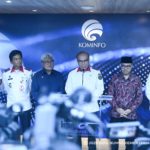The rapid development of search engines and the high level of social media usage as a source of news have also seen search engines such as Google turn into news aggregators. They aggregate news from local media and publish them on their news bait pages, such as the likes of MSN News, Yahoo! News, or Line Today are doing.
These media have the potential to draw a profit from the traffic of local news on their search pages. The principle of a search engine is that it searches for a variety of information based on queries entered by users. It surfs the internet and captures results in various forms, including news, video, text, and images. These are then uploaded on the page of the search engine, including in the form of a news index from various media sources.
However, this news collection and distribution is not conducted through special cooperation so that the sources of the news cannot draw any share of the ad revenues collected by the search engine. So far, there has been no obligation for search engines such as Google and Facebook to pay the local media as rightful owners of the news they use.
Data from the Press Council has indicated the monopoly in revenues from these online ads. A total of 56 percent of global ad expenditures went into the hands of just three companies – Google, Facebook, and Amazon. The remaining 44 percent goes to tens of thousands of local media in print, radio, television, and also local e-commerce in various countries.
The large gap in ad revenues has prompted concerns over the business prospects of Indonesian media operators. Media have even to post ads in these search engines so that their news remains on top of the search lists. What an irony for the very media which are the sources of news of these three digital giants.
In response to these concerns, the Press Council, on National Press Day 2022 last February, pushed a proposal for the implementation of a publisher rights regulation by the government.
The scope of the proposed publisher rights regulation submitted to the government is the protection of journalistic intellectual property rights, transparency in the algorithm or data, and control over the monopolistic distribution of content or digital ads.
The Protection of Journalistic Intellectual Property Rights
The protection of journalistic intellectual property rights covers the collection by search engines of news, in writing or in photographs from local media. At present, these search engines can use those news without the permission or cooperation of the news’ publisher. Photographs can be republished without mentioning credits or paying any royalty to the owner of the photograph.
Journalistic work appearing in the media have gone through a process and incurred costs that are not negligible. The imposition of a permit to distribute content through an adequate profit-sharing mechanism will provide some sort of recognition to the media and their journalists.
Transparency of Algorithm system and Data
Changes in algorithm and user data transparency have also become important points in these proposed regulations. Owners of search engines and digital platforms are currently able to change the algorithm and use users’ data for their own needs.
What publishers are hoping for is transparency in data and the algorithm created by the search engine based on the news input from the publishers. Transparency in the algorithm is important for online media because it can influence the news content that is uploaded. The media must follow a number of rules set by the algorithm of the search engine so that their news can more easily be found by readers.
Besides algorithm, another important issue has to do with engagement. Search engines will push news with high engagement (clicks, shares, and comments) regardless of whether the news is of a sensational nature or is of low quality. This carries a negative impact by promoting journalistic works that prioritize engagement rather than the quality of the news itself.
Another impact related to algorithm and engagement is that caused by hoax news. A news report written without any accurate source but that managed to gain a high level of engagement can give rise to differences in opinion and thus trigger conflicts within the society. The draft of the publisher rights regulation will also hold search engines responsible if such hoax news gets distributed through their platform.
Controlling Distribution Monopoly in Content and Digital Ads
Agus Sudibyo, Member of the Press Council for the 2019-2022 period, in his statement to the media said that the regulation on publisher rights is important for the Indonesian media industry because that regulation will cover the rights of media operators in relation to the process of private aggregation.
A private aggregation process means that media operators have the intellectual property rights over their works and also over revenues derived from the publication of their work on a search engine webpage or any other digital platforms. If this proposal is accepted, the government would be able to manage and reduce the excessive monopolistic practices of digital platforms.
The academic draft of this publisher rights regulation is currently being processed by the Ministry of Communication and Informatics and is scheduled for completion this year. The ministry is currently studying the legal umbrellas for this regulation. There are currently three options for the legal form of this regulation – as a draft bill, as a revision of existing laws covering the media industry or, the fastest way is to just publish it as a Government Regulation (PP).
One country that has designed a publisher rights regulation is Australia, through its News Media Bargaining Code. This regulation obliges digital platforms such as Facebook and Google to pay the media for news contents they upload on their webpage.
The value of the payment is left to be negotiated and agreed between the digital platform and the local media. The value will differ depending on the scale of the media and the number of content published by the search engines.
The challenge to the implementation of such a regulation in Indonesia is the enormous amount of media compared to those in Australia. In 2021, there were 1,700 registered media according to the Press Council. Looking at the Australian case, there is also no certainty in standards regarding the value of the payment and this is entirely dependent on the results of the closed negotiations. A good collaboration between regulators and media owners is key to the implementation of this regulation.
***
Written by Christiani Ajeng Rianti, Associate



